Lakis Fourouklas's Blog, page 13
January 26, 2013
Book Review: The Book of Virtue by Ken Bruen

I will say it right from the start: This eBook short would be much
better if it was a little bit longer. The story is good, the plot is
solid, the humor is a big plus, but the pages are just not enough.
The Book of Virtue is the story of a young man who's suffered a lot in the
hands of his abusive father, a man who was "Tough. Cruel. Merciless...
when he was happy." Frank was a cop, working in the streets of New York,
so when he could not appease his rage on the thugs, he did it by
hitting his son. His police pals described him as difficult, but he knew
him better than that. So when he died he was more than happy, and in
his memory he played "Another One Bites the Dust."
After his
father's death, things changed for the better. He got a job at a fancy
club and started making some money, and he was in love with his best
friend's girlfriend, CiCi. CiCi and he seemed to have a lot in common.
They liked the same things, they definitely liked each other, and they
loved books; or at least she did, since she combined "Sensuality with
knowledge," while he was not a great reader. In fact the only book he
has read in ages was the one that his father left him, called Virtue,
which made him think that maybe his old man was trying to fill in the
blanks of his education with that single volume.
We don't get to
learn too much about CiCi's reading habits though, since right now the
time has come for both of them to move on with their lives. They know
how to do it, how to score big, but they need to move carefully, in
order to make things work out the way they want them to. Thank God she's
a brilliant girl who can really come up with a great plan, but...
The
characters are well-crafted and the twists and turns quite surprising,
but as I've already mentioned this story is a bit short for my taste. A
more elaborate plot or a wider cast of characters could do it some good

Published on January 26, 2013 01:18
January 22, 2013
Book Review: Phantom by Jo Nesbø
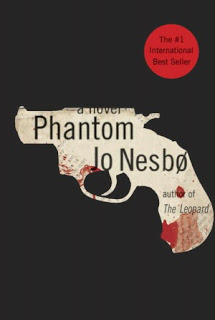
Harry Hole, Jo Nesbø’s damaged hero comes back from retirement in order to help Oleg, the boy he helped raise—in a past that now that seems as distant to him as his own youth— prove his innocence in a murder case.
Phantom is the most appropriate title one could think for this novel. Hole is a phantom of his old self, and is haunted by his past, but he’s also on the hunt for a man nobody seems to know much about.
His return to Oslo from Hong Kong, where he has somehow managed to make a new beginning feels almost like an ordeal to him. He feels at a loss in his own city, a city whose streets and alleys, bars and underground dens knows like the back of his hand. I no longer belong here, he seems to think, and perhaps he’s right.
But how can you help someone who doesn’t want your help? How can you get into places, find people, and ask questions, when you no longer carry a badge? Harry has no juice anymore, no power, and if it wasn’t for an old colleague he’d feel as lonely as one could be in his native land. Even Rakel, his ex-lover and Oleg’s mother, the woman who summoned him, doesn’t seem to want to come in close contact with him.
Despite all the obstacles though or from a sense of duty towards the former or love for the latter, he simply cannot get on a plane and fly back to the place he came from. So he checks-in in a rundown hotel and starts investigating. This case though will prove hard to crack, since more often than not he finds himself at a dead end; every answer he gets gives birth to new questions, and every clue he follows seems to lead him to yet another dark place, to yet another labyrinth.
As the reader follows Harry through the darkness of the streets, he comes face to face with junkies and drug dealers, with cold-blooded killers and some desperate people; people like him. At times he feels like that he should give everything up and leave, but deep down he knows that he’d never do that. He loves Oleg, and so he’ll keep on fighting for him, even though the boy of the past, the young man of today, doesn’t really seem to like him anymore. Could he be hiding something from him? Did he actually kill the man he’s accused of killing?
He has to find the answers, no matter what, and he has to keep fighting with his personal demon; the one that keeps telling him to go to a bar and lose his self in oblivion. But he doesn’t drink anymore, and he really shouldn’t start again now. Not now, not quite yet.
Jo Nesbø delivers another great yet bleak crime fiction novel that talks about the darkness that lurks in the hearts of men.

Published on January 22, 2013 00:46
January 17, 2013
Book Review: Revenge by Yoko Ogawa

Yoko Ogawa is one of my favorite Japanese writers. Her novels are more often than not bleak, she describes worlds and lives where usually things tend to go wrong. And there’s a kind of sadness throughout her narratives; a sadness that somehow manages to make the reader smile. Reading a Yoko Ogawa story is like watching a House M.D. episode as Dr. James Wilson announces to a patient that he’s going to die and the latter thanks him for it.
Revenge (out on January 29, 2013) is the first short story collection by the author that comes out in English, even though I am not quite sure I can call it so. The eleven tales included in this volume are in one way or another connected with each other. The author plays with voices and the timeline, as she takes the reader from head to head, from situation to situation.
For some reason there are no happy endings in these stories, and maybe that’s exactly what makes them so special. We read about everyday lives, but highly unusual ones. We get to visit a garden where carrots that have the shape of hands grow, a museum of torture, a deserted zoo, a hospital, and a high-end hotel. As we follow the heroes from place to place, from sorrow to sorrow, the interest mounts, making us feel that desperate people are doomed to lead desperate lives.
“The room smells of death and disinfectant,” we read in Lab Coats, but the truth is that the whole book smells of death. There are no heroes here, only antiheroes. As they traverse from tale to tale, and narrate their own sad stories, death seems to follow their every step. Most of them are eccentric. One is an inventor of sorts that somehow becomes a museum curator; another is a painter, and one of the most important ones is an author. And somehow they all seem to have reached a dead end in their lives.
Maybe it’s the city, the hectic pace of life that makes them feel at a loss, but maybe not, as they do find the time to go places, sit still in a bakery and reminiscence, spend some time at a hotel, or even take care of a Bengal tiger.
The author has a unique way of placing people together at one place or another, at connecting the dots of their lives together, without even showing that she’s doing that. It’s as if she’s trying to say that we are all fragmented people, leading interconnected lives.
The prose is as beautiful as it could be, and having read some of Ogawa’s books both in Greek and English I can say that Stephen Snyder did a great job with the translation, since the stories at hand read like they were originally written in this language. This tome was a joy to read and I’m certain that I’ll return to it in the future.

Published on January 17, 2013 01:44
January 10, 2013
Book Review: An Acceptable Sacrifice by Jeffery Deaver
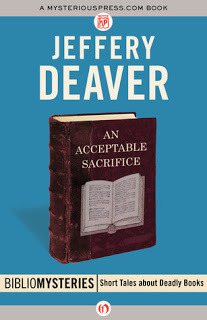
If there’s one thing I really like about Jeffery Deaver’s short stories, is that they always manage to surprise the reader, one way or another. An Acceptable Sacrifice is not the exception to that rule.
It all begins with the meeting of two partners in crime, or rather law-enforcement. An American agent and his Mexican counterpart set house in the city of Hermosillo in Sonora, Mexico, with a single mission in mind; to stop a terrorist attack from happening.
They, and their respective agencies, suspect that a local drug lord is planning an attack on a tourist bus to mark the anniversary of the local government’s war on drugs. The man behind the planned attack is someone who’s so clever, and looks so clean and respectable, that no one ever managed to find a single clue that he’s involved in any illegal activities.
The two agents have their doubts that he’s indeed a criminal mastermind, but they have no choice but to carry on with their mission. The order is simple and clear: take him out before he takes anyone else out.
But how can they do that? The man lives in huge house, behind thick walls and bulletproof windows that looks like a fortress. They have to find a way to get in and plant a bomb, but in order to accomplish that they first need to spot his weakness, and he doesn’t seem to have one. Or does he?
Well, everyone has a weakness, and since this eBook belongs in a series consisting of Bibliomysteries it makes sense that his is books. He likes to collect old and valuable tomes from all around the world and he’s an avid reader. “That’s it,” the agents think and they start planning the attack; an attack that won’t be so easy to carry out; not only because their target is a very suspicious man, but also because timing is of the utter importance. Will they make it or will everything go wrong? And what if the man isn’t who they believe him to be?
As one would expect from a master storyteller, when it comes to the crime genre there are no easy answers to questions like these. Read the story, enjoy the plot, and prepare yourselves to be surprised time and again, by its few but yet great twists and turns.
By the same author:
XO
Edge
No Rest for the Dead

Published on January 10, 2013 03:34
January 9, 2013
Man Asian Literary Prize Shorlist Announced
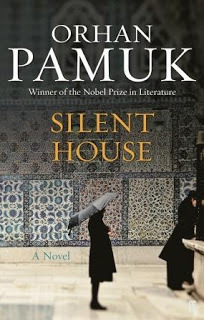
The Man Asian Literary Prize shortlist has been announced, and it includes no surprises since all of the books included in it have received favorable reviews in the western press, with the exception, I think, of Hiromi Kawakami's The Briefcase.
As of next year the Prize will seize to exist under its current name and the organizing committee is on the lookout for some new sponsors, which I guess won't be so hard to come by. Here's this year's list:
Between Clay and Dust by Musharraf Ali Farooqi
The Briefcase by Hiromi Kawakami
Silent House by Orhan Pamuk
The Garden of Evening Mists by Tan Twan Eng
Narcopolis by Jeet Thayil

Published on January 09, 2013 06:08
January 3, 2013
The Costa Award Winners
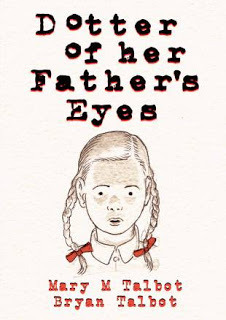
I was delighted to find out that one of the best graphic novels I've read last year, and which unfortunately I haven't found the time to review yet, has won the Costa prize in the biography category. Dotter of her Father's Eyes is a beautifully told story, illustrated in a masterful way. It brings to life the characters' stories in an almost intimate manner and highlights their feelings without ever becoming melodramatic. Anyway, I'd highly recommend it to everyone.
Here's the list of the winners in every category, who by a lucky coincidence are all women:
Novel:
Bring up the Bodies by Hilary Mantel
First Novel:
The Innocents by Francesca Segal
Biography:
Dotter of her Father's Eyes by Mary M. Talbot and Bryan Talbot
Poetry:
The Overhaul by Kathleen Jamie
Children's Book:
Maggot Moon by Sally Gardner

Published on January 03, 2013 02:37
December 28, 2012
Book Review: The Testament of Mary by Colm Tóibín
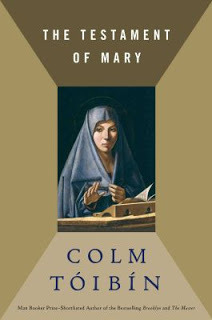
The Testament of Mary is one of those books which leave a bittersweet taste in the reader’s mouth at the end. This has nothing to do with religion; it has everything to do with the sadness that seems to prevail from beginning to end.
The author tells in a beautifully flowing first person narration the story of Mary, or at least some of its parts. Mary in this novella looks like a woman bathed in sorrow. As she recounts the events that lead to her son’s death and their aftermath, she seems weak, secretly angry and quite bitter. And she doesn’t seem to have a shred of sympathy for Jesus before he met his end and his followers. In her eyes they were all part of a conspiracy that she doesn’t name but is quite clear for everyone to see.
Her memories are vivid, “I remember too much;” she says, “I am like the air on a calm day as it holds itself still, letting nothing escape. As the world holds its breath, I keep memory in.”
Nothing escapes her but sleep. She cannot sleep because the recent events have shaken her world; her son’s miracles, the fact that he publicly renounced her, his arrest, trial and crucifixion. But these are not the things upset her the most, it’s her visitors; two of his disciples that come to her time and again, trying to shape her memories into their own liking, determined to convince her that their version of the events is the true one.
“No,” she wants to cry out loud, “no, I wasn’t there until the very end,” but they pay no attention to her, they’ll write the story the way they want it, no matter what. She’s sick of men, and especially these ones: “…all my life when I have seen more than two men I have seen foolishness and I have seen cruelty…” In a way she’s also disappointed of her son, who, she feels has wasted his life for no reason at all: “It was not worth it,” she says, his death served no one.
Her words, her thoughts may sound heretic, but they simply come out of the bleeding heart of a grieving mother: “There are times in these days before death comes with my name in whispers, calling me towards darkness, lulling me towards rest, when I know that I want more from the world. Not much, but more. It is simple. If water can be changed into wine and the dead can be brought back, then I want time pushed back. I want to live again before my son’s death happened, or before he left home, when he was a baby and his father was alive and there was ease in the world.”
But these days are gone. Now even her own story doesn’t belong to her, even her life depends on the charity of others. The only thing she’s left with is her memories, and a bitterness that just doesn’t let go of her tortured soul.
A tale beautifully told in exquisite prose by a master storyteller.

Published on December 28, 2012 05:04
December 20, 2012
Book Review: Standing in Another Man’s Grave by Ian Rankin
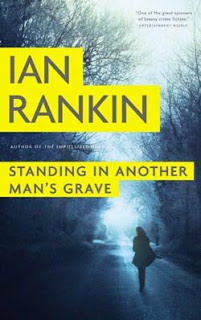
Joy to the world of crime fiction, Rebus is back with a bang. Standing in Another Man’s Grave is one of the best crime novels of the year, and if you don’t believe me that’s your problem.
As Ian Rankin came to realize letting one of your favorite heroes go is not an easy thing to do and thank god for that. Rebus, after taking a short break, returns to the pages of his creator and lets him know that it won’t be so easy to get rid of him. What if he works in cold cases as an outsider? What if the unit is about to close? Nothing really matters to Rebus, apart from solving crimes and punishing the perps one way or another.
At the beginning of the book he seems a bit lost as he enters a world where he’s spend most of his life, but which now seems alien to him. His protégée Siobhan Clarke now holds a higher position than him and she seems to be going places, unlike him whose life never changes. As he realizes at some point he’s an analog man in a digital world. However analog sometimes is better than digital.
Rebus is at his strongest when he’s at his lowest. When everyone is against him he rises up to the challenge and gets things done. And when he’s the target, he’s the one who pulls the trigger first.
One of the most interesting things in this book is the co-existence in the same pages of Rebus and Rankin’s latest cop hero, Malcolm Fox. Fox doesn’t like Rebus and he shows it, he’s determined to take him down as soon as possible; but no matter how hard he tries he’s never able to pin anything specific on him. Yes, he does have drinks with a mob boss, whose life he’s saved, every now and then; yes, he does frequent places which he shouldn’t; and yes, he does tend to take the law into his own hands time and again; but he gets results. He may be old school, but he goes where nobody else can. He may drink a lot, but he works more than everyone, despite his age.
Fox and Rebus are similar in a way: committed, headstrong, restless, but they cannot see that. When they look at each other they only see yet another enemy, whereas if they were working together they could be friends, despite the fact that Fox doesn’t drink.
As for the story, it all begins with a murder that Rebus cannot investigate, and the reopening of an old case which he can. A woman shows up at the unit claiming that her daughter’s disappearance many years ago is connected with those of some other young women. Rebus decides to take a look at the file and he sooner rather than later realizes that the woman had a point. All the women disappeared in the same area and they’ve never been seen ever since. So he starts investigating. And the more he investigates, the more clues he brings to light, and the more enemies he makes. He’s no angel, everyone knows that, but when he’s on the hunt he’ll do anything to get his man. He doesn’t care about department politics, public relations, and keeping up pretenses with colleagues, and that’s his curse, and that’s his blessing.
Siobhan knows that where everyone else fails Rebus succeeds, so despite the fact that working with him could put her career in jeopardy at the end she decides to give him a helping hand. He’ll do all the leg work, and she’ll be there when the need arises. If not for any reason because she likes him; she likes the fact that he wants to bring justice to the victims no matter what; and he does make her smile.
Well, all in all I’d say that this is one of the best Rebus novels yet. The good detective came back from his break stronger and hungry for action. What a character! Really, what a character! Thumbs up, Mr. Rankin.

Published on December 20, 2012 04:32
December 17, 2012
Vanity

I’m trying to create the hologram of my future self,
But it comes out foggy,
Almost like the dream of a day that scatters with
The first blow of the wind of a warm night.
I think hard, I look forward, I plan, and then
I return to today, to reality, disillusioned,
Though always knowing that, I’ll never change;
At least not as long as I struggle to.
Change is only easy as a word.
The outer circumstances often change their skin
And the way they feel but
At the end of the day they remain the same.
You say:
“I’m not sad because I’m lonely,
I’m lonely because I’m sad,”
And that sorrow looks bulletproof.
I seek what I cannot find
And I find what I do not seek;
My life’s story in brief but also
The story of every life.
Time and again I speak the same words
To different people.
Time and again I hear the same words
From different people.
Is this the circle of life?
Of a life that doesn’t move in circles
But follows different paths?
Up and down, and zigzag its goes, and the thought
That anyone could ever change
Its course remains just that:
No more than a thought.
Life writes the rules and life enforces them;
Thus every effort to overwrite them
Proves vain,
Just like life itself, a pessimist would say.

Published on December 17, 2012 02:52
December 7, 2012
Graphic Book Review: Hawken by Benjamin and Timothy Truman
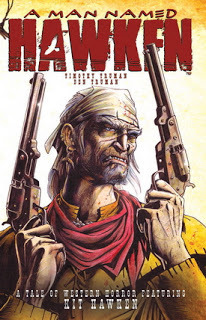
Hawken by Benjamin and Timothy Truman is a graphic novel that tells the story of a killer unlike any other, a man that seems to be a force of nature.
Tim Truman returns to the Weird West! The industry legend teams with his son, writer Ben Truman, for a violent new tale of the supernatural! In the land of the lawless rode the soulless! Scout, hunter, raider, killer-for-hire: Kitchell Hawken has been many things - most of them bad. Scalped, tortured, and left for dead by the mysterious order called the Ring, Hawken returns, seeking vengeance... but surrounded by the ghosts of every person he's ever killed!
This is one of those special graphic novels that keep the reader constantly at the edge of his sit. There’s too much action in it, great characters, some hints of dry humor here and there, and a plot that drives the narrative from peak to peak.
An old man is riding a blind mule, in 1881, on a trail called The Road of Death that goes through the Sonoran Desert. He has done many bad things in his life. And his name is Hawken. And that’s just about how the story begins; a story full of villains, and in which bloodsheds are never too many pages apart.
Hawken is a man with a mission, and he’s determined to accomplish it no matter what. As it’s already established he’s no angel, but there are worst human beings out there; beings that need to die and thus follow him every step of the way as he heads for his final destination.
The journey will prove long but the old man rode because he was not yet finished. His enemies are plenty, and they all belong to the Ring, a gang or an order of sorts, unlike any other.
Hatred seems to be the keyword in this story. The hatred he feels for his enemies; the hatred they feel for him. In fact everybody seems to hate everyone else, yet: It is rare for a man to kindle a hatred that burns so brightly that it has the power to touch the unliving. Well, Hawken does. And that’s what keeps him going; from town to town, from massacre to massacre.
The strange thing is that the most of the humor here is provided by his victims, his ghosts. They argue with him, they have a laugh at his back, and they urge him to move forward until he reaches his goal. So it comes as no surprise that when some philosophy finds its way into the text, it has to do with them:
“All men are haunted, whether by ghosts or by memories.”
Though, “sometimes it is the living who are the ghosts.”
This team of father and son do a great job in delivering to the reader a story that is not only gripping but also hard to forget. Hawken is a character that plants himself into your memory and makes you think of his persona and his mission again and again. I guess in the hands of a capable and imaginable director this could make a beautifully dark and slightly funny movie.

Published on December 07, 2012 04:05



